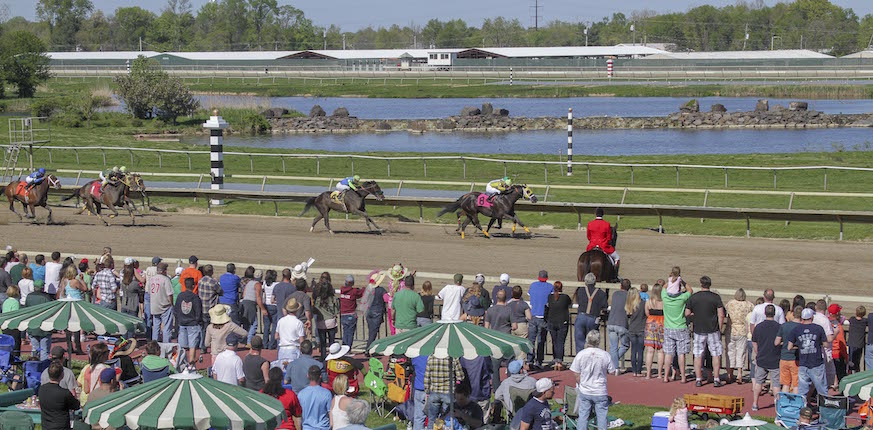Horse racing has always had an allure, a glamorous dash of the stylish and the seedy that’s made it the subject of far-flung fiction (e.g. newspaperman-turned-short story writer Damon Runyon) and epic film-making (e.g. “The Black Stallion”).Whether on the track or behind the scenes, horse racing comes with its own éclat.
There are issues, nationally and locally in which to contend. People for the Ethical Treatment of Animals (PETA) has contended that racehorses have issues with drug abuse and injuries that go untended. As recently as July, Pennsylvania Department of Agriculture and the Pennsylvania State Horse Racing Commission were studying reports of equine toxicology error. Gov. Tom Wolf and state racing industry leaders have battled as to who would pay for mandatory drug testing. All the while, Pennsylvania Equine Coalition, Pennsylvania Thoroughbred Horsemen’s Association and other like-minded stakeholders and benefactors have been looking hard and long to improve the health, welfare and safety of horses, jockeys and harness drivers in the state.
“The system is broken, and needs to be fixed,” said Agriculture Secretary Russell Redding at the equine/agricultural site Country Folks. “This problem has persisted for years. There has been a 71 percent decline in wagers placed on live horse racing in the state [of Pennsylvania] since 2001. This means there has been less revenue for the oversight of the industry.”
To the rescue comes the recently-formed Pennsylvania Horse Racing Association (PHRA) who wants to get Pennsylvanians back to the tracks, millennials, in particular, who have never been anywhere near a horse, and couldn’t tell a trifecta from a trip or a tag. To that end, PHRA – the union of Pennsylvania Harness Horsemen’s Association, Pennsylvania Horse Breeders Association, Pennsylvania Horsemen’s Benevolent and Protective Association, Pennsylvania Thoroughbred Horsemen’s Association, and the Standardbred Breeders Association of Pennsylvania – hired Harrisburg-based Pavone Marketing Group to aid them in their effort. Pavone has worked with the local likes of WXPN 88.5 and, in regard to fast-forward motion, the independently-owned, NASCAR superspeedway, Poconos Raceway.
Together, PHRA and Pavone want to boost a healthy racing enterprise across Pennsylvania’s seven race tracks — one that contributes $1.6 billion in economic activity annually within Pennsylvania, while employing 23,000-plus people statewide – into something consistent, young and with an even greater presence.
Gabrielle DeNofrio, Pavone’s Associate Creative Director, was brought in for the job, not just because she’s “fresh out of the millennial bracket,” but rather, because since age 5, she’s been off-track, thoroughbred trained. “Horse racing by extension was something I have always loved and followed,” said DeNofrio. “The promotion with PHRA was a natural for me.”
Ashley Eisenbeil, PHRA’s Director of Marketing, and its spokesperson Pete Peterson, have their own levels of growth within the industry; Eisenbeil, in particular, who worked at Baltimore’s Pimlico Race Course, planning events in-and-around its famed Preakness Stakes. “I would go to the track every day, talk with people raised with horses, go to simulcast rooms with older gentleman laying their bets, teaching me how to handicap and read race forms, meeting jockeys, groomers, trainers,” she said. “I fell in love with the culture.”
Peterson noted that dealing with majestic animals and fun, proactive atmospheres such as the Preakness is different from any other form of traditional gaming or sport. “There have always been more variables than man and beast going on [within horse racing], a different kind of excitement and interaction – all which is why we’d like to see it return,” said Peterson.

Horse racing undergoes a marketing push
After Chester County’s Smarty Jones – the thoroughbred winner of 2004’s Kentucky Derby and Preakness Stakes (he finished second in the Belmont Stakes) — focused eyes on Pennsylvania horse racing, so too did legislators prick up their collective ears. “With the push to get casino gambling and ancillary online gaming in the state, such legal forms of gambling took money away from horse racing gambling,” noted Peterson. “To insure that PA’s horse racing industry wasn’t harmed, a portion of casino revenue went to supporting the industry through award purses, breeders incentives and health benefits. This made legalizing gambling across the state more palatable to rural legislators looking after farms and breeders. However, more state marketing revenue went to advertising casinos as profit margins were larger, so what horsemen and breeders decided to do was market themselves with help from but 1 percent of money they got from award purses and breeders incentives.” Hence the PHRA, put in place to combat the effects of present day distractions from racing, “such as Netflix, video games and on-line gaming,” noted Peterson. “We want to get people to the track – live.”
Presenting the culture, difference and excitement of horse racing to a crowd — millennials — that never witnessed the sport is the job that PHRA and Pavone have ahead of them, to bring in young blood to keep the industry growing and healthier, all while managing its authenticity. “Horse racing on a track is unlike any other gaming, wagering or sporting experience,” said DeNofrio. “Millennials have to know how truly interactive this is, how easy it is to be part of the action – you can get right on the track’s apron. You can practically lean in and touch it.”
Eisenbeil added to that a sense of skill and speed to the proceedings that’s lends hard heft to the proceedings. “Races take mere minutes. They’re win or lose, and you know right away.” DeNofrio quickly added that, in the present day, people are in love with throwback vibes. “Everything old is new again – the retro feel of whiskey, handlebar mustaches, handmade crafts, men and women wearing hats.” she said. “Millennials are loving all things authentic, and horse racing meets that criteria. From its physical effort to the pageantry to its animals bonding with the riders to the fact that you can choose your own level of involvement – studying up on stats or just picking a horse because you like the color; it’s all there. Young people will respond to this.”
Look for the presence of the PHRA’s marketing push at Parx Casino and Racing’s Pennsylvania Derby & Cotillion Day on September 22 in Bensalem, and November 3 and 4’s Breeders’ Cup 2018 in Kentucky.
















